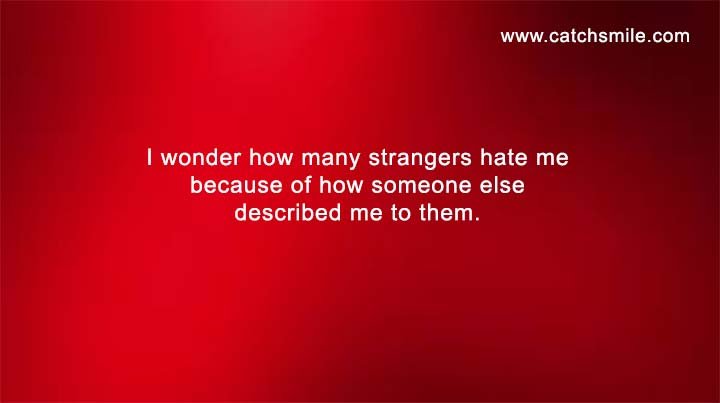I wonder how many strangers hate me because of how someone else described me to them.
The Invisible Impact: When Someone Else’s Words Shape How Strangers See You
Have you ever stopped to wonder how many people you’ve never met already have an opinion about you? It’s a strange thought, isn’t it? To think that there might be people out there—strangers—who dislike or even hate you, not because of something you did, but because of how someone else described you to them. This unsettling idea brings to light the power of words and the lasting impact they can have on our reputations and relationships.
The Ripple Effect of Words
We’ve all been guilty of talking about others, whether it’s in casual conversation, out of frustration, or in confidence with a close friend. But what we often don’t consider is the ripple effect that our words can have once they leave our mouths. When we describe someone to another person, we’re not just sharing facts—we’re sharing our perceptions, biases, and emotions. And these can color the way others see that person, often in ways that are difficult to undo.
Imagine this scenario: a friend describes you to someone you’ve never met. Maybe they’re upset with you, or maybe they just don’t see eye-to-eye with you on something important. The version of you they share might be skewed by their own feelings, casting you in a negative light. Now, this stranger has formed an opinion of you based on a secondhand account—one that may not be fair or accurate. And the most unsettling part? You may never have the chance to change their mind.
The Weight of Misunderstandings
When we realize that others might dislike us based on someone else’s description, it can stir up a lot of emotions. It’s frustrating to think that we might be judged unfairly or that our character could be misrepresented. This leads to the question: How much control do we really have over how others perceive us?
The truth is, we don’t have as much control as we’d like. People are going to talk, and not every conversation will portray us in a positive light. Misunderstandings, miscommunications, and even personal grudges can all contribute to a distorted image of who we are. It’s a reminder that no matter how hard we try to be good, kind, or fair, someone else’s words can still paint us in a completely different color.
Living Beyond the Fear of Judgment
So, what can we do about it? How do we navigate a world where our reputation is partly in the hands of others? The first step is accepting that we can’t control everything. People are going to form opinions, and some of those opinions might not be favorable. But that doesn’t mean we should live in fear or constantly worry about what others think.
Instead, focus on what you can control: your actions and your character. Be the best version of yourself in every interaction, and let your true self shine through. Over time, the people who matter will see who you really are, not the distorted version someone else might have described.
It’s also important to practice empathy. Remember that just as someone might have an unfair opinion of you based on what they’ve heard, you might also hold unfair opinions about others. Try to approach new people with an open mind, giving them the chance to show who they really are, rather than relying solely on what others have said.
The Power of Positive Words
While it’s disheartening to think about the negative impact words can have, it’s equally important to remember the positive impact they can create. Just as someone’s harsh description can cause a stranger to dislike you, a kind and fair description can lead to respect, admiration, and even friendship.
We all have the power to influence how others see the people around us. By choosing to speak positively about others, by highlighting their strengths and acknowledging their good qualities, we can help build a world where people are judged more fairly. And in doing so, we can also encourage others to speak kindly about us.
Conclusion
The idea that strangers might hate you because of someone else’s words is a sobering thought, but it’s also a reminder of the power we hold in our words. We may not be able to control how others describe us, but we can choose to live authentically, to speak kindly, and to give others the benefit of the doubt.
In the end, the best we can do is to be true to ourselves and to trust that our character will shine through, no matter what someone else might say. And who knows? Maybe the stranger who once judged you unfairly will one day see the real you and realize how wrong they were.








